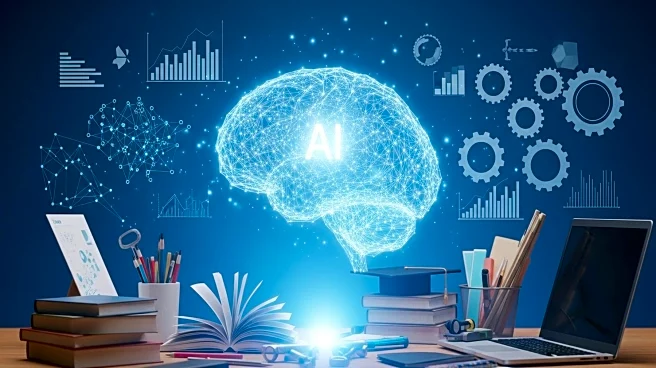What is the story about?
What's Happening?
The rise of artificial intelligence (AI) is prompting companies to prioritize workforce reskilling, especially in the wake of significant layoffs. Tata Consultancy Services (TCS) recently laid off 12,000 mid- and senior-level employees, highlighting the need for professionals to adapt to rapidly changing skill requirements. Companies like Plum Benefits and Pegasystems are implementing AI tools to streamline operations and enhance accountability. The demand for mid- and senior-level roles in tech and IT services has decreased, necessitating continuous skill updates. Upskilling platforms like Coursera and Simplilearn report increased enrollments, particularly in AI, cybersecurity, and leadership programs. This trend reflects a broader industry shift towards integrating AI and automation, requiring professionals to stay relevant in evolving tech landscapes.
Why It's Important?
The focus on reskilling is crucial as AI and automation reshape industries, impacting job roles and skill requirements. Companies investing in upskilling are better positioned to maintain competitiveness and drive innovation. Professionals who adapt to new technologies can enhance their career prospects and contribute to strategic business transformations. The shift towards AI fluency and data literacy is essential for leaders to effectively integrate technology into business strategies. Organizations that neglect workforce reskilling risk losing institutional knowledge and facing fragmented execution. By aligning learning with business outcomes, companies can ensure their workforce remains agile and capable of leading technological advancements.
What's Next?
Organizations are expected to continue integrating AI into their operations, necessitating ongoing reskilling efforts. Companies may develop more personalized learning journeys to address specific skill gaps and align with business goals. As AI adoption increases, professionals will need to embrace continuous learning to stay competitive. The focus will likely shift towards embedding AI in decision-making processes at all levels, requiring leaders to be tech-immersed and data literate. Companies may also explore partnerships with upskilling platforms to provide accessible learning opportunities for their employees.
Beyond the Headlines
The ethical implications of AI adoption, such as bias detection and ethical judgment, are becoming increasingly important. Human-centered leadership is emerging as a differentiator, emphasizing empathy and contextual decision-making. As automation takes over routine tasks, leaders must cultivate trust and support their teams through role redefinitions. The integration of AI into business strategies requires a shift in leadership mindset, moving from tech-awareness to tech-immersion.















